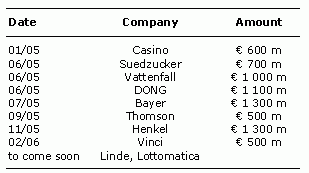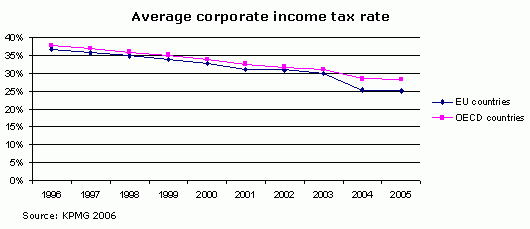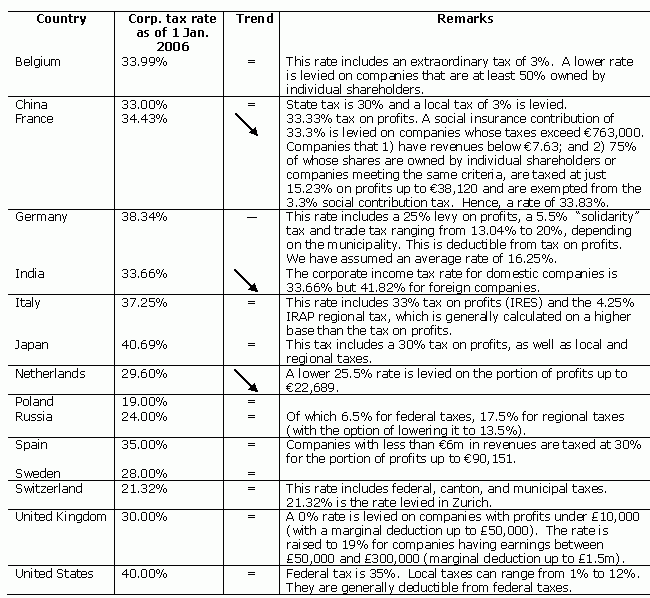Letter number 15 of April 2006
- TOPIC
- STATISTICS
- RESEARCH
- QUESTIONS & COMMENTS
News : Hybrid securities
We have seen a large number of subordinated securities recently (both in terms of number of issues and volumes), which is being driven by a real demand from investors who are finding companies that are keen to issue such securities.
These are some recent issues of subordinated securities by non-financial companies:
But what exactly is a subordinated security ?
It is a category of securities issued by a company which is inserted between normal debt (bank loans or bonds) and equity. They are the riskiest debt securities that could possibly be imagined:
Given this higher risk, the returns are obviously substantially higher than for other debt securities. For example, Dong (the Danish oil and gas exploration services company) issued standard 7-year bonds and hybrid securities simultaneously. The standard 7-year bonds were issued at an interest rate of 3.5% (a spread of 52 basis points), while the hybrid securities paid interest of 5.5% (spread of 220 basis points).
These securities, which are being issued more and more frequently, have in fact been around for a long time. Until recently, they were mainly used by banks or insurance companies. These products have the significant advantage of strengthening equity capital (Tier 1 capital), which means better solvency ratios for financial institutions. And accordingly, the arbitrage between high cost and strengthening financial solidity is expressed in banks by the amount of subordinated securities issued.
The increased issue of subordinated securities by other companies has been encouraged by several fundamental changes in finance. The first is certainly the growing importance of rating agencies, and more generally of financial rating, for companies. Financial rating is a form of external monitoring (3) of the financial solidity of the company, just like solvency ratios are relied on for assessing financial institutions. When rating agencies calculate the ratios that they will use for determining the rating of a company, they “credit” issues of subordinated securities with a component of equity capital, ie, they split the issue into a debt component and an equity component. The equity credit that they grant to the issue can vary between 40 to 75% (40-60% for S&P, 50 to 75% for Moody’s) and depends on the specific features of each issue (4). Additionally, under IFRS, some issues can be considered as equity, which improves the balance sheet, although in our view, this is inconsistent with a financial approach.
(2) Depending on the product, interest is either waived definitively (non cumulative interest) or capitalised and paid at a later stage The suspension of interest payments may either be optional, if decided by the issuer, or automatic if certain ratios are reached.
Statistics : Corporate income tax rates worldwide
In addition, Austria and the Netherlands significantly reduced their rates.
Research : Are poison pills harmful?
The French parliament has hust adopted a law that, subject to conditions, allows targets of takeovers to allocate free warrants to their shareholders to subscribe new shares at a price that is (much) lower than the market price.
his means that hostile assailants will be taking the risk of acquiring 97% of the target’s capital, at for example €100 per share, only to see their investment immediately diluted to 19.4% if, and still speaking hypothetically, four warrants had been allocated to each share entitling the shareholder to subscribe a new share at €1. The share would now not be worth more than €20.80. This is a very poisonous pill indeed and should encourage even the most daring of assailants to think long and hard about whether it really does want to launch a hostile bid.
Robert Comment and G. William Schwert (2) showed how poison pills, including the warrants described above, appeared in the USA in the 1980s and were very soon quite common – in the early 1990s, one-third of listed US companies had poison pills. Contrary to a commonly-held idea at the time, their appearance and general adoption were not responsible for the end of the M&A boom in the late 1980s. The blame for that can be placed squarely on the economic recession that started in 1990 and the disappearance of the large, undervalued conglomerates, which were the favourite targets for restructurings at the time (3).
Relying on the work of other researchers, Comment and Schwert show that the introduction of poison pills only reduced the share price of companies that made use of them by less than 2%, which is a negligible amount.
Unsurprisingly, they also show that the probability of a company which puts a poison pill in place becoming the target of a hostile bid is much higher than for a company without a poison pill. The reasoning behind this is obviously endogenous – a company that fears being taken over generally has good reason to do so (low share price, poor operating performances, dispersed shareholder base, etc.) and accordingly, there's a good change that it'll become a target for a takeover, and by extension, a good chance that it'll introduce a poison pill.
But more importantly, the authors show that takeover premiums are highest for companies that have put a poison pill in place than for others. These companies are thus in a better negotiating position, not for protecting management, but for obtaining better financial terms from the buyer in exchange for waiving the exercise of their warrants, which is very good news for their shareholders.
We might well ask why the share price drops a little when the introduction of a poison pill is announced, when this poison pill could ultimately result in a higher control premium being paid in the event of a takeover bid? Common and Schwert find that the market overestimated the harmful effects of poison pills and underestimated the greater negotiating power they give the target.
It should be clear then that the poison pill does not provide absolute protection either. Even if in the USA, no buyer has acquired a company that had issued dillutive warrants without reaching an agreement with the target before hand, ensuring that they will be waived.
Q&A : Definition of some equity capital market terms
Bought deal: A bought deal takes place when a bank buys the securities from the seller/issuer and then re-sells them to investors. The remaining unsold securities go onto the bank’s balance sheet. Bought deals are used most often for transactions such as block trades of already existing shares or a bond issue.
Clawback:Claw-back clause allows the securities allocated to one class of investors to be reallocated to the other class of investors, should the structure of actual market demand (retail, institutional, etc) differ from that planned originally.
Flowback:Flow-back is the excessive sale of securities immediately after their placement.
Greenshoe: A greenshoe is an option granted by the seller/issuer to the bank to buy at the price of offering a number of supplementary shares over and above the number offered to investors.
For more, have a look on chapter 31 of the Vernimmen devoted to how securities are sold to investors.



